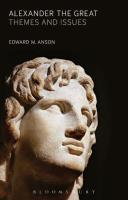
Bloomsbury Academic (2013) p/b 240pp p/b £18.89 (ISBN 9781441193797)
The reign of Alexander the Great (the epithet occurs for the first time in Plautus but undoubtedly predates him) was as meteoric as it was short. King of Macedon at twenty, he conquered 2,000,000 square miles of territory, toppling the wealthy Persian Empire, carefully curating his own image, and vying for fame with gods and heroes, before dying in Babylon aged thirty-two. Worshipped in life, in death he inspired a multitude of histories, biographies, romances and films, as successive generations revisited his achievements, shoe-horning them to fit the values and preconceptions of the day.
Beginning with an excellent introduction covering sources and issues such as the Greek world’s views on war and slavery (so very different to our own), A.’s slim volume tackles five interconnected aspects of Alexander’s life and times—fourth-century BC Macedonia; the legacy of Alexander’s father, Philip II; Alexander and deification; Alexander and the administration of an empire; and the kingdom of Asia—before concluding with a brief consideration of his legacy.
Readers coming fresh from A.’s recent Philip II, The Father of Alexander the Great (as this reviewer did) will find a fair degree of overlap in the first two chapters of this earlier book, and could skip them without loss. Others, however, will discover much that is valuable, not least A.’s discussion of how, thanks to military reforms linked to the annexation of gold and silver mines, Philip created a new land-owning middle class, a loyal power base to rival elite noble families, allowing him to redefine the concept of the Macedonian monarch, now no longer first among equals but absolute (though still approachable) autocrat—or how, through a mix of force and guile, he spread his power throughout most of the Greek mainland, adopting and adapting for his own end existing structures of government, and establishing himself as the champion of the gods (especially Apollo in the Sacred Wars over Delphi).
It is clear then why A. concludes, regarding Alexander, that ‘few sons have owed so much to their fathers’. Or perhaps to their mothers. For it was Olympias who first suggested that Alexander’s real father was Zeus, and it was she and her kinsmen who first inspired him with tales of his ancestors, Heracles and Achilles, taught him the heroic maxim ‘always to be first and to surpass all others’ and inspired his desire ‘to exceed not only all living, but in time also the heroic dead, and even certain immortals’. Closely argued, and painstakingly researched A.’s chapters on Alexander strip off the distorting varnish of romance to reveal an utterly plausible picture of a ruthless young man ambitious to be ‘world king’, who chose to visit the oracle at Siwah because he knew that there, being pharaoh of Egypt, he would be greeted as a god, who (far from seeking to spread the benefits of culture) avoided tribal heartlands and focussed his attacks on civilised, soft centres ripe for plunder, and who ultimately failed to reconcile his Macedonian and Persian subjects, all of whom he regarded as his inferiors, and from whom, growing ever more neurotic and distrustful, he became increasingly remote.
While not being for the general reader, this book—with two maps, end notes and a comprehensive bibliography—is a must for the library of any scholar with an interest in Alexander and the society from which he came. If its conclusion is stark, it is nonetheless worth repeating: ‘Alexander’s ultimate goal was personal glory. He was not out to change the world, he was out to conquer it.’
David Stuttard
